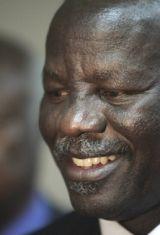Sudan FM seeks to ease tensions with Chad
April 11, 2007 (KHARTOUM) — Sudan is determined to a seek a peaceful solution to the deadly violence that has erupted with its neighbour Chad, Foreign Minister Lam Akol said.

“Sudan is firmly committed to finding a peaceful solution to this problem,” Akol said, toning down Khartoum’s threat of retaliation for Chad’s involvement in the deadly border violence.
Chadian troops chased rebels across its border on Monday, leading to direct clashes with the Sudanese army. Khartoum said 17 of its troops were killed in the clash but N’Djamena apologised for the incident.
Sudan had accused Chad of violating a 2006 border agreement the two neighbours signed in Tripoli that Sudan maintains has been unobserved for the past year.
Libyan leader Moamer Kadhafi was to send an envoy, Abdel Salem Triki, to Sudan and Chad on Wednesday for talks aimed at easing tensions between the two countries.
Akol spoke after a meeting with South African President Thabo Mbeki, who travelled on Wednesday to Juba, the capital of semi-autonomous southern Sudan.
Mbeki was a key mediator in the negotiations that led to the January 2005 signing of a peace agreement ending Sudan’s 21-year-long north-south civil war.
During his meeting later Wednesday in Khartoum with President Omar al-Beshir and First Vice President Salva Kiir, Mbeki is expected to urge the government to accept the United Nations peacekeeping plan for Darfur.
Khartoum has so far accepted most of the first two stages of former UN chief Kofi Annan’s plan for a reinforcement of the embattled African Union (AU) contingent currently deployed in the troubled western Sudanese region.
Akol said however that Sudan remained opposed to the deployment of helicopter gunships in Darfur.
The first two phases of the plan involve mainly UN logistical and technical support for the 7,000-strong African force but the third and most contentious phase is supposed to lead to the deployment of a joint — or “hybrid” — AU-UN force.
The latest clashes between Chad and Sudan have heightened fears that the four-year-old conflict in Darfur would spill over to neighbouring countries, which also include the Central African Republic.
(AFP)
